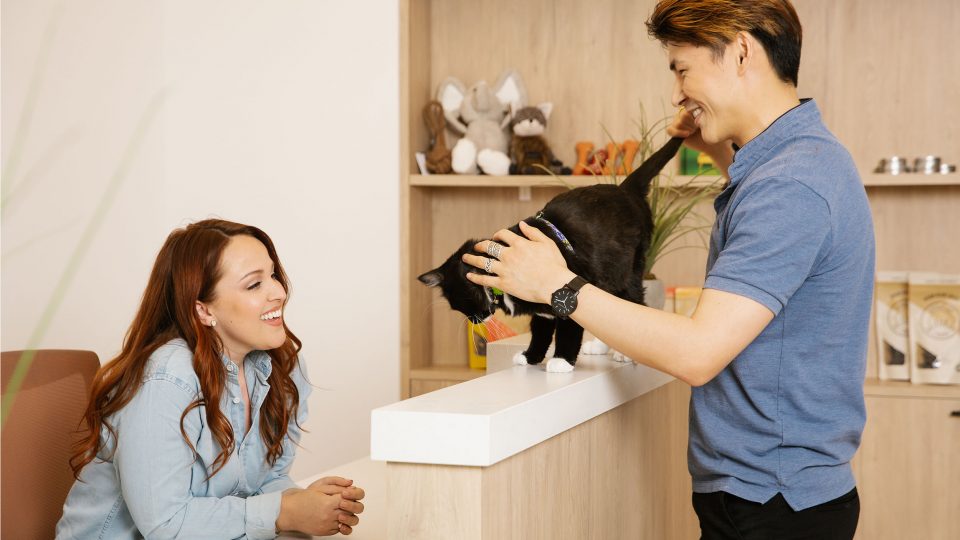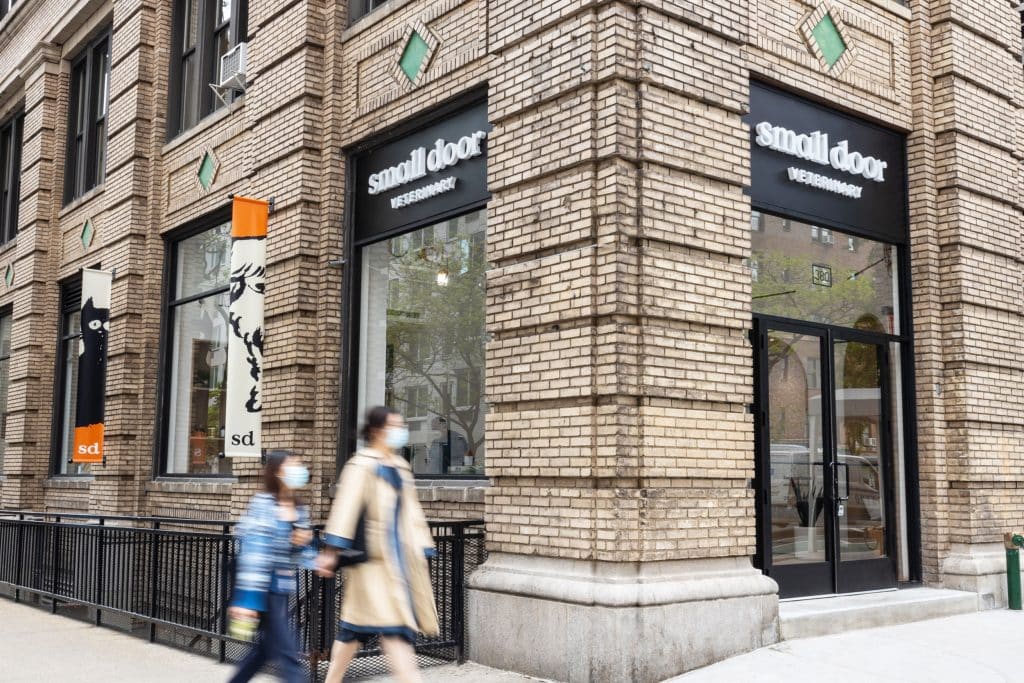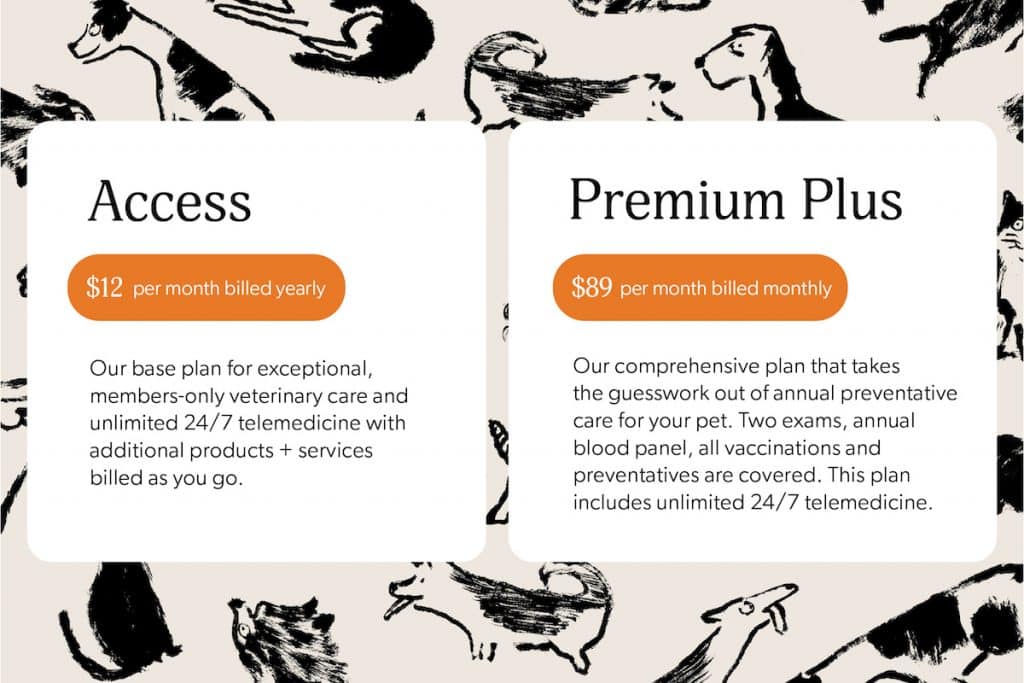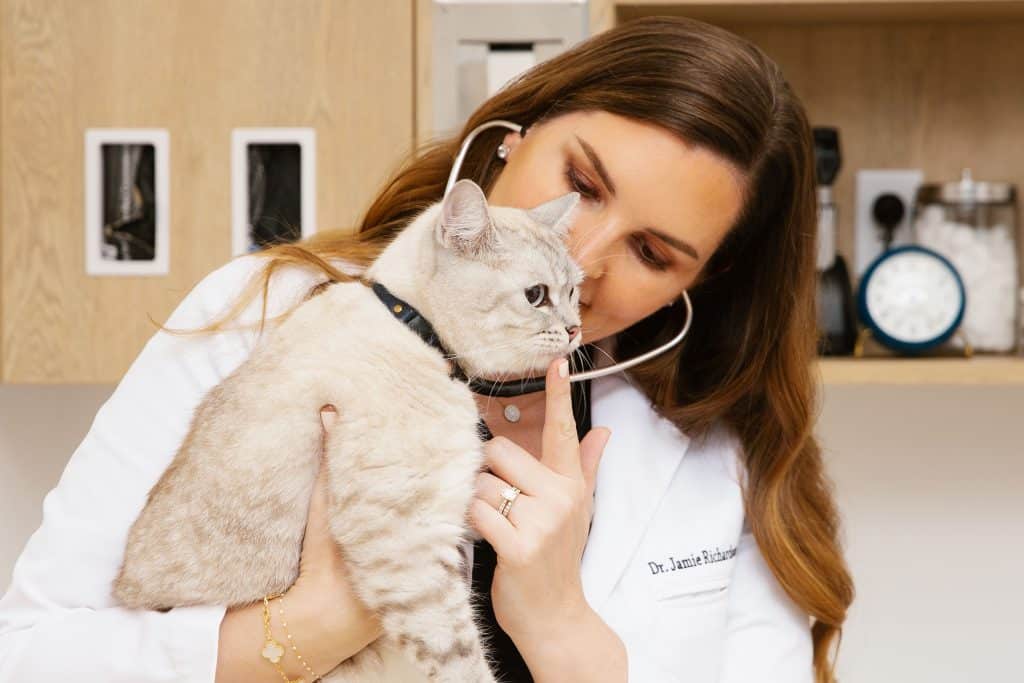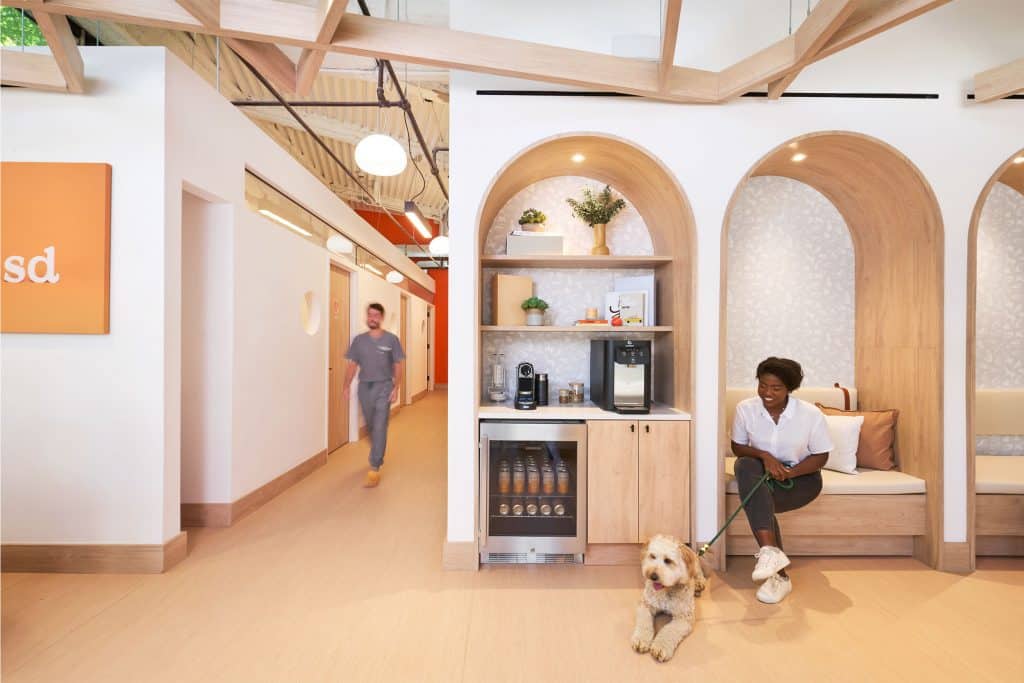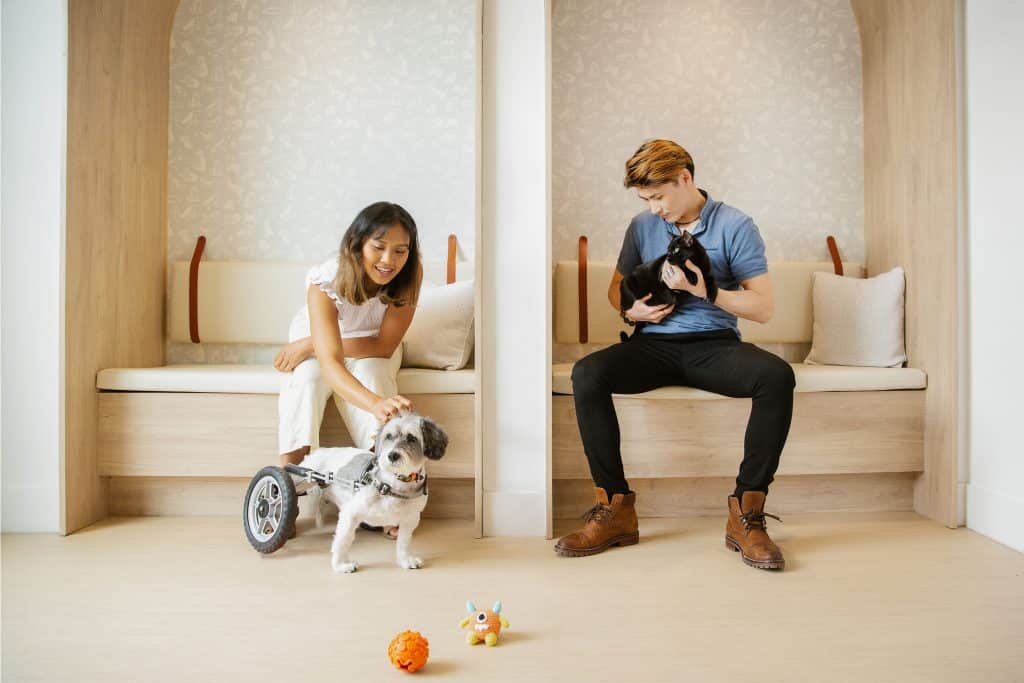- This post contains affiliate links. Read more here.
- Not a substitute for professional veterinary help.
This article was produced in partnership with Small Door Veterinary.
If you’ve had trouble getting a vet appointment this past year, you’re not alone. Heightened demand, professional burnout, and a shrinking number of new graduates in the field have resulted in a shortage that’s been felt the country over, especially in cities where the population is densest.
Enter Small Door Veterinary, a new kind of practice seeking to turn traditional pet care on its head with a membership model that’s offering the care pet parents need—when they need it.
We talked with Dr. Jamie Richardson, the Head of Veterinary Medicine at Small Door, to find out what’s different about Small Door and how its novel approach to pet care could become the new standard in an industry under siege.
Access to Pet Care Has Become Increasingly Challenging, Especially in Big Cities
The vet shortage has highlighted one of the most serious challenges pet parents living in large urban centers face: access to care. Over the last year, pet parents have waited weeks or even months for appointments with their pet’s primary care vet, and emergency clinics have been forced to turn patients away. It’s a scary thought for a lot of us—and unfortunately, the problem isn’t going away any time soon.
The challenge isn’t so much an increase in the number of pets as a sea change in the way pet parents are thinking about and reacting to health concerns—something the pandemic’s enforced time at home encouraged.
Then there’s the cultural shift that sees young people delaying having children and opting for pets instead, as Dr. Richardson points out. “People are pouring their hearts and souls into pet care,” she says, “and expectations are higher than ever.”
Those expectations are hard to meet in a system that’s under strain as more and more practitioners walk away from their careers, citing burnout and overwork. With just 2,500 to 2,600 graduates becoming veterinarians each year, the industry is expected to see a deficit of 15,000 vets nationwide by 2030.
That’s the problem that Small Door Veterinary is hoping to solve with their new practices in New York City, Boston, and Washington DC. The most striking change they’re making? A membership model of veterinary care that reliably offers members same- or next-day appointments.
Small Door Membership Offers Veterinary Care with Compassion
A Small Door membership boasts a host of perks, but for pet parents worried about the vet shortage, the most striking is reliable access to its practices. For $12 per month for dogs or $8 for cats, Small Door promises its members that primary pet care is just a few clicks away. You can make a same- or next-day appointment at any of its five locations.
When a practice starts to reach capacity, Small Door opens a new space to accommodate the demand.
See Membership PlansBecause of the membership model, Dr. Richardson explains, “We’re only two and a half years into this, and we’re just coming out of the pandemic, but we can track patterns of behavior that help us understand what our ability to hold appointments is. We don’t cram in ten surgeries a day. We get to manage our caseload.”
The benefits of a practice that stays at or below capacity echo throughout the organization.
“The vet is with you the whole time,” Dr. Richardson says. “At Small Door, you practice the kind of medicine you thought you would when you went to vet school, not the conveyor belt model.”
She doesn’t blame the industry for the pressures that have wreaked havoc on its systems—but she’s seen firsthand the advantages of a lighter caseload: “When you don’t have enough face time, you don’t have the time to present options, plan A and plan B, and really partner with the pet parent.”
That partnership is the foundation of reasonable, pet-tailored treatment plans. Dr. Richardson offers the example of a pet parent panicking at the thought of persuading a pill-hating Chihuahua to take five medications per day. “It’s just not realistic for that Chihuahua,” she says, explaining that the treatment plan could be modified to accommodate that particular pup’s needs.
The extra face time also makes a difference in a pet’s comfort level. “It’s an awful feeling when you see a pet cower or urinate because they’re scared,” Dr. Richardson says, noting that extra time to acclimate can dramatically reduce the stress of an exam. She offers cats as an example: she never starts an appointment by touching a cat, instead letting them check out the room for 15 to 20 minutes first.
For many vets, exploration time is an unimaginable luxury—but it’s fast becoming the standard at Small Door. “There are dogs who wait at the door to be let in,” she says with disbelief. “Not all of them—but some. And I’ve never seen that anywhere else.”
Small Door’s Stress-Free Pet Spaces
Extra face time isn’t the only thing making vet visits less stressful for pets. Dr. Richardson thinks the design of the practices plays a big role. “They’re massive,” she says frankly of the space, explaining that Small Door has intentionally curated their practices to separate pets and keep them from crowding each other.
There are private nooks in the waiting area and tables and pedestals for cats who would prefer not to be on the floor (plus some forthcoming wall-mounted cat trees in exam rooms, Dr. Richardson tells us enthusiastically). Dogs tend to make a beeline for the big windows and the couches, where exams are often conducted.
Floors are designed to be tactile and slip-free, which is good for senior pets, and all spaces are meticulously cleaned. Anti-odor candles minimize animal smells to keep pets (and pet parents) calm.
For the cats and dogs who will never be keen on the vet, no matter how cozy the space, accommodations are possible. “We have time to talk about medications that can reduce anxiety—if a pet needs help to make it through the visit, that’s okay. And just because they’re not trying to bite you doesn’t mean they don’t need help to be comfortable.” Small Door’s training emphasizes recognizing fear and discomfort in dogs and cats.
Nor are pharmaceuticals the only answer. “We had one pet owner ask if we could go outside and throw a ball with his dog to make him more comfortable going in,” Dr. Richardson recalls with a smile. “We did that.”
She doesn’t want to make hospitality sound like magic, but she thinks it’s part of vet care. “I honestly believe you can do both: excellent medical care as well as making people feel seen and heard.”
24/7 Telemedicine and Teletriage
Small Door’s determination to offer pet parents access to pet care isn’t limited to in-person visits; the practices also have US-based medical staff available to answer questions via app around the clock—even on holidays.
They can field general pet questions like “what antiseptic is okay to use on my dog’s scuffed elbow?” or “how much of this new kibble should I be feeding?”
And they can also provide critical advice to help you evaluate the seriousness of your pet’s condition. A nurse might determine that the amount of chocolate a female Pug ate isn’t enough to warrant a vet visit. Or they might schedule an immediate appointment for a male cat who’s crying and making repeated trips to the litter box.
Under certain conditions, veterinarians can even prescribe over the phone—making Small Door’s telehealth service different from the others of its kind that have popped up in recent years.
“I hear positive feedback on this every day,” Dr. Richardson says. She’s especially proud of the telehealth team, who are an integral part of Small Door’s operation. “These are our nurses—we don’t outsource this to a third party. They have access to our medical records, which creates a seamless experience for pet parents. I know their names. We have book clubs with them. They’re in our Slack channels.”
A Model That Could Change Vet Care
Small Door is a relatively small operation at the moment, with just nine practices in three cities: New York, Boston, and Washington DC. But its impact promises to be outsized, and we’ll be watching this space. The model Dr. Richardson and team have laid out has the potential to change the vet industry for the better.
Dr. Richardson acknowledges it: “We’re really trying to partner with our members in their pet’s healthcare and become the preeminent general practice for pet owners in the country,” she says with determination. We think she and her teammates have a good chance of succeeding.
For more information, visit Small Door on the web and use discount code ROVER75 for $75 off your membership.
